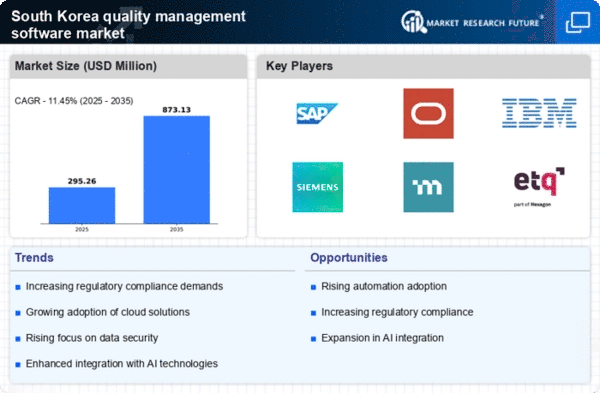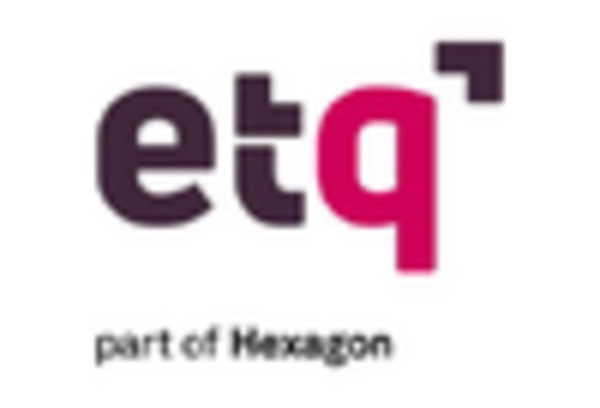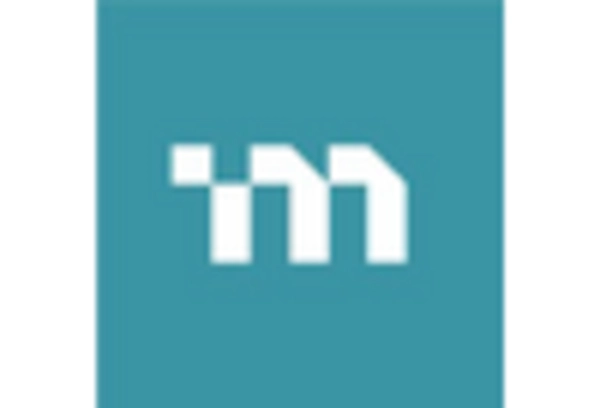Rising Demand for Quality Assurance
The quality management-software market in South Korea experiences a notable surge in demand driven by the increasing emphasis on quality assurance across various industries. As businesses strive to enhance their operational efficiency and product reliability, the adoption of quality management software becomes essential. In 2025, the market is projected to grow at a CAGR of approximately 12%, reflecting the urgent need for organizations to implement robust quality control measures. This trend is particularly evident in sectors such as manufacturing and healthcare, where compliance with stringent quality standards is paramount. The growing awareness of the benefits of quality management systems, including reduced defects and improved customer satisfaction, further propels the market forward. Consequently, companies are investing in advanced software solutions to streamline their quality assurance processes, thereby fostering a competitive edge in the marketplace.
Increased Focus on Customer Satisfaction
In the current landscape, the quality management-software market in South Korea is significantly influenced by the heightened focus on customer satisfaction. Organizations are increasingly aware that delivering high-quality products and services is crucial for retaining customers and enhancing brand loyalty. As a result, there is a growing trend towards implementing quality management software that facilitates customer feedback integration and quality monitoring. In 2025, it is projected that companies investing in quality management solutions will see a 15% increase in customer retention rates. This shift underscores the importance of aligning quality management practices with customer expectations, thereby driving the demand for software that supports continuous improvement and responsiveness to customer needs. Consequently, businesses are prioritizing quality management systems that not only ensure compliance but also enhance the overall customer experience.
Global Supply Chain Management Challenges
The quality management-software market in South Korea is also shaped by the challenges associated with global supply chain management. As companies expand their operations internationally, they face increasing complexities in maintaining quality standards across diverse suppliers and production facilities. This situation necessitates the adoption of quality management software that can effectively monitor and manage quality across the supply chain. In 2025, it is anticipated that approximately 30% of organizations will implement software solutions specifically designed to address supply chain quality issues. By leveraging these tools, businesses can ensure that their products meet the required quality standards, regardless of where they are sourced or manufactured. This focus on supply chain quality management not only mitigates risks but also enhances overall operational efficiency, thereby driving growth in the quality management-software market.
Regulatory Pressures and Compliance Needs
Regulatory pressures significantly impact the quality management-software market in South Korea, as organizations strive to comply with various industry standards and regulations. The increasing complexity of regulatory requirements necessitates the implementation of robust quality management systems that can ensure compliance and mitigate risks. In 2025, it is expected that around 25% of companies will prioritize investments in quality management software to address these compliance needs. This trend is particularly pronounced in highly regulated sectors such as pharmaceuticals and food production, where adherence to quality standards is critical. By utilizing quality management software, organizations can streamline their compliance processes, reduce the likelihood of regulatory breaches, and enhance their overall quality assurance efforts. As regulatory scrutiny intensifies, the demand for effective quality management solutions is likely to grow, further propelling the market forward.
Technological Advancements in Software Solutions
Technological advancements play a pivotal role in shaping the quality management-software market in South Korea. The integration of cutting-edge technologies such as cloud computing, big data analytics, and IoT significantly enhances the capabilities of quality management systems. These innovations enable organizations to collect and analyze vast amounts of data, leading to more informed decision-making and improved quality outcomes. In 2025, it is estimated that around 40% of quality management software solutions will incorporate AI-driven analytics, allowing for predictive quality management. This shift towards more sophisticated software solutions not only streamlines processes but also reduces operational costs. As businesses increasingly recognize the value of leveraging technology to optimize quality management practices, the market is likely to witness accelerated growth, driven by the demand for innovative and efficient software solutions.
















